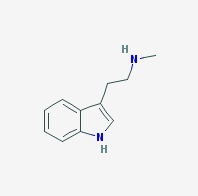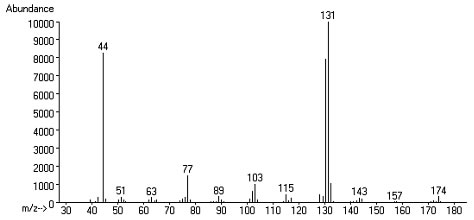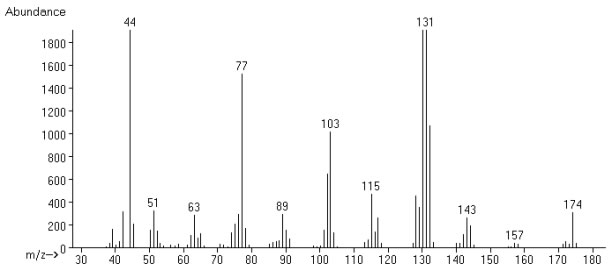NMT
Contents
- 1 Brief overview - What is NMT?
- 2 Chemical and physical properties
- 3 Effects
- 4 Pharmacology, toxicity and general safety
- 5 Plants containing NMT
- 5.1 Acacia spp.
- 5.2 Anadenanthera spp.
- 5.3 Arthrophytum spp.
- 5.4 Calycanthus spp.
- 5.5 Delosperma spp.
- 5.6 Desmanthus spp.
- 5.7 Diplopterys spp.
- 5.8 Girgensohnia spp.
- 5.9 Haloxylon spp.
- 5.10 Hammada spp. =
- 5.11 Hordeum vulgare
- 5.12 Justicia spp.
- 5.13 Mimosa spp.
- 5.14 Nectandra spp.
- 5.15 Petalostylis spp.
- 5.16 Phalaris spp.
- 5.17 Psychotria spp.
- 5.18 Swainsona spp.
- 5.19 Tachigalia spp.
- 5.20 Testulea spp.
- 5.21 Virola spp.
- 5.22 Zanthoxylum spp.
- 5.23 Humans and other animals
- 6 Extraction teks
- 7 Dosages and consumption methods
- 8 Analysis of NMT
- 9 Scientific publications
- 10 Other links of interest
Brief overview - What is NMT?
NMT is a tryptamine found in several plants, previously thought to be inactive, but novel research done by Nen888 has shown it to be psychoactive.
Chemical and physical properties
For solubility, melting point, etc, check the NMT Chemical and Physical Properties WIKI
Effects
- 1/3 to 1/4 potency of DMT. A slower onset than DMT, coming up after about 3-5 minutes and peaking within a minute, with residual low effects over an hour to 70 minutes thereafter. Nen (2001))
- A higher body load and lower visual and mental activity than DMT. (https://www.dmt-nexus.me/forum/default.aspx?g=posts&m=503394&#post503394)
- Further info: TIHKAL NMT entry
A slower onset than DMT, coming up after about 3-5 minutes and peaking within a minute, with a gradual taper over an hour to 70 minutes thereafter.
Pharmacology, toxicity and general safety
- Present in trace amounts as part of normal metabolism (Source)
Plants containing NMT
Acacia spp.
- Possible but unconfirmed presence. Detected· in Fall 1993, Spring, Summer, Fall 1994 and Spring 1995; tlc by Appleseed.
Acacia confusa (=A. richei A .Gray)
- Unspecified amount in bark. Lou et al. 1965
- 1.43% in (dried?) root-bark Liu et at. 1977 (55.25% of total alkaloid) Root bark total alkaloid content was 2.58%
- 0.04% in dried stem Arthur et at. 1967 (8.8 kg. of stems yielded 3.1 gm. NMT & 1.3 gm. DMT.)
- 0.24% in dry bark. Fitzgerald & Sioumis 1965.
- [Tentative positive in roots as the major alkaloid. (unconfirmed) tlc by Appleseed 1994) (2 year old seed grown plants)
- Suspected to co-occur with DMT (tlc by Appleseed).
- Mulga ran hplc-ms and observed what appeared to be a simple tryptamine but was unclear if the identity was this alkaloid or tryptamine as the parent fragments seemed to be lacking; see http://www. lycaeum.org/drugsiplants/ tryptamines/acacia/species.htm & Trout's Notes on Acacias 2004.
- 60% of total alkaloid in common form - D. Siebert 1997; southern Cross Uni. 2000 cited by Nen
- 4.6 ppm in early spring/54.9 ppm in late fall. Fresh leaves, petioles & tender twigs. Clement et al. 1998
Acacia simplicifolia [=A. simplex?]
- 1.44% in bark and 0.29% in twigs.
- Stem bark has 3.6% total alkaloid content. N-Methyltryptamine (40% of total)
- Twigs have 0.11% total alkaloid content. N-Methyltryptamine (26.3% of total). Poupat et al. 1976 ref Trout's Notes
Anadenanthera spp.
- No.24625; Origin: Boa Vista, Brazil]. -Traces in dry bark. (Agurell et al. 1969 ref Trout's Notes)
- Bark of Brazilian material (as Piptadenia). Legler & Tschesche 1963 reported a mixture of 5-MeO-NMT and NMT as comprising 41% of the crude base.
- as Piptadenia peregrina bark (Colombia in 1956). (Holmstedt & Lindgren 1967 ref Trout's Notes
Arthrophytum spp.
Arthrophytum leptocladum M.Popov (Thin -stemmed Haloxyton)
- 0.575% by dry weight in 1 year old Green shoots (Flowering stage) (3.7% total alkaloid content; Major alkaloid. Cooccurring with 2 b-carbolines.) Platonova el at. 1958. ref Trout's Notes
- In leaf and stem. Smith 1977b cited Yurashevski 1941 Zhur. Obsch.Chem. 11:157 and Rousseau et al. 1966 Bull.Soc.Pharm.Nancy 71:31
Arthrophytum wackchanica [A. wakhanicum?J
- Smith 1977b cited Orekhov 1955 ref
Calycanthus spp.
Calycanthus has been listed as containing NMT. This is probably in error. Manske 1931a & 193lc reported NMT as a degradation product of Calycanthine. Unable to locate any reference indicating its actual presence.
Delosperma spp.
Presence of MMT in Delosperma spp. is unproven, except for the unpublished data involving work done by the Smith, Kline & French Laboratories. (Cited by Raffauf 1970). Smith 1977b cited Rivier & Pilet 1971 and Deulofeu 1973. Both had cited Raffauf 1970.
- Assays by Appleseed 1994- 1996 ref Trout's Notes:
- Faint. Sept., Nov. 1994 and Nov. 1995 assays. (Ehrlich's)
- Nov. 1995 assay (Xanthydrol)
- Sept. 1994 and Nov. 1995 assays. (Ehrlich's and Xanthydrol)
- Nov. 1995 assay (Xanthydrol)
- Nov. 1995 assay. (Xanthydrol)
- Audhali Plateau, Yemen Nov. 1995 assay. traces (Xanthydrol)
- Dec. 94 (Ehrlichs) Nov. 95 assay. traces (Xanthydrol)
- Nov. and Dec. assays. Sole base present. (Xanthydrol and Ehrlich's) Not seen Sept. 96 assay.
- Nov. 1995 assay. (Xanthydrol)
- Same plant tested Christmas 1994) 2 Nov. 1995. Dark band (Xanthydrol)
- Different plant from same source) Dec. 1994 assay. (Ehrlich's)
- Nov. 1994 assay. (Ehrlich's). Suspected MMT was major. All faint.
Desmanthus spp.
- 0.11% in Root bark (dried) and 0. 0016% in Root wood (dried) Thompson et al. 1987 ref Trout's Notes
- Tentative NMT presence in dried root bark (present in most but not all specimens) Appleseed tlc 1993-1994.
Diplopterys spp.
- Traces in leaf. Agurell et al. ( 1968)a
Girgensohnia spp.
Girgensohnia diptera Bge.
- Yurashevski & Stepanov(a?) 1939 (Smith 1977b) ref Trout's Notes
Haloxylon spp.
- Shulgin & Shulgin 1997
Hammada spp. =
- In leaf and stem. Orazkulyev et at. 1964 (Grazkuliev et at. 1964 Zh. prikl.Khim. Leningr., 37: 1394; according to Arthur et at. 1967.)
Hordeum vulgare
- roots of seedlings?) Schneider & Wightman 1974 ref Trout's Notes
Justicia spp.
- In leaf. Shulgin & Shulgin 1997
- var. stenophylla -In leaf. 31 August 1994 harvest. Faint band corresponding MMT. TLC by Appleseed ref Trout's Notes
Mimosa spp.
- 0.0012% dry wt. in roots. Batista et al. 1999
- In stem Batista & Almeida 1997 (No quantification)
- In bark. De Moraes et al. 1990 (No quantification)
- 0.029% in dry whole plant. Gupta et al. 1979
Nectandra spp.
Nectandra megapotamica (Sprg.) Chodat & Hassler 0.57 gm. from 5.7 kg. of finely powdered bark. Filho & Gilbert 1975
Petalostylis spp.
- var. casseoides. This is in error [Chemical Abstracts] See Johns et al. 1966a (Included by a number of references including Mears & Mabry in Harbourne et al. 1971: 146)
Phalaris spp.
- cv. Ottawa Synthetic - Amounts not given. Detected by tlc. Woods & Clark 1971
- cv. AQ-1 Occurence reported (HPLC). Festi & Samorini 1994b
- Commercial) Weak occurrence reported (HPLC). Festi & Samorini 1994b
- cv. Australian Commercial - Minor alkaloid in seedlings. Mack et al. 1988
- A minor alkaloid in 7 day old seedlings. Mulvena & Slaytor 1983
Phalaris paradoxa (Romania)
- Traces reported (HPLC). Festi & Samorini 1994b
Phalaris truncata (France)
- Traces reported (HPLC). Festi & Samorini 1994b
Psychotria spp.
- ["Rami appant'; Culina Indians, Marcos. Collected 4 Sept 1968.] Traces of NMT Rivier & Lindgren 1972 ref Trout's Notes
- ["Rami appant'; Culina Indians, Zapote. Collected 22 July 1968]. Traces of NMT and 2-Methyl- 1,2,3,4-tetrahydro-B-carboline as minor alkaloids. Rivier & Lindgren 1972 ref Trout's Notes
- "Kawa Kut'; Sharanahua Indians, Marcos. Collected 7 October, 1968). NMT was major alkaloid in leaf [85% of 0.11% total alkaloids by dry wt.]. DMT was absent (12% of O.11% total] Rivier & Lindgren 1972 ref Trout's Notes
Swainsona spp.
Swainsona galegifolia (=S. coronillifolia Salisb.)
- (Possible assay in stem and leaf. Contradictory results.) tlc by J. Appleseed
Tachigalia spp.
Tachigalia paniculata A ubi. 0.005% w/w of previously prepared inflorescence extract. No information on plant we ight. Svoboda et af. 1979
Testulea spp.
- Total alkaloids in Stem bark- 2.5% and in Root bark- 5%. N-Methyltryptamine was 90% of total. Leboeuf et al. 1977 ref Trout's Notes
Virola spp.
- 'Epena'· [No.24574; Origin: Rio Cauaburi, Brazil] - 0.014% N-Methyltryptamine: i.e. 14.3 mg. / 100 grams of sn uff. (2% of 715 mg total alkaloid per 100 gm.]
- " Nytzkwtina" [No . 24626; Origin: Tototobi, Brazil] - Traces Agurell et al. 1969
- Snuff: " Epena" ( Virola?) Snuff as prepared by Waica Indians (collected 1965). MMT (with DMT and 5-MeO-DMT]. Holmstedt & Lindgren 1967
- [No.24603; Origin: Manaus, Brazil] Flowering shoots- 0.0077% NMT; 7.7 mg/ 100 gm (4% of 193 mg. of total alkaloids/ 100 gm. of dry flowering shoots]; Leaf- 0.0062% NMT i.e. 6.2 mg/ 100 gm [4% of 155 mg. of total alkaloids/ 100 gm. of dry leaves]. Agurell et al. 1969 ref Trout's Notes
- Bark collected in Manaus, Brazil during 1964. NMT (with DMT and 5-MeO-DMT). Holmstedt & Lindgren 1967 ref Trout's Notes
- No.24612: Origin : Manaus, Brazil]. Leaf- 0.0059% i.e. 5.88 mg/ 100 gm [6% of 98 mg. of total alkaloids/ 100 gm. dry leaf]. Agurell et al. 1969
- Present in bark Kawanishi et al. 1985
- Paste: Virola sebifera (DMK-40; Don Marcos no. I) NMT 1.38 mg/ ml. McKenna et al. 1984a
- No.24595; Origin: Manaus, Brazil. Bark- 0.0025% (i.e. 2.5 mg/ 100 gm) [1% of 250 mg. of total alkaloids/ 100 gm. dry]. - Flowering shoots- 0.033% (i.e. 32.9 mg/ 100 gm) [7% of 470mg. of total alkaloids/ 100 gm. of dry flowering shoots] - Agurell et al. 1969 ref Trout's Notes
- Bark- 0.0034% [8 mg from 235 gm. of bark]. Cassady et al. 1972, also 1971 The latter cited Cassady et al. 1970 (Published 1972] ref Trout's Notes
Zanthoxylum spp.
- 0.002% in lear (dry weight) Grina et al. 1982 ref Trout's Notes
Humans and other animals
- Animals:
Villagorgia rubra (A sea fan from New Caledonia)
- Espada et al. 1993 ref Trout's Notes
Paramuricea chamaeleon
30 mg. of NMT isolated from 200 grams of coral. Cimino& DeStefano 1978 ref Trout's Notes
- Found in cerebrospinal fluid of some psychotics and some normal people by Corbett et al. 1978. ref Trout's Notes
- Oon & Rodnight 1977 thought they observed in psychoties but did not prove.
- See Davis 1989 for many more references on the reported natural occurrences of N-methyltryptamine in humans:
Extraction teks
Dosages and consumption methods
30-100mg vaporised (duration 45-70 minutes), 50-180mg orally with MAOIs (duration 2-5 hours) - Nen (2001; 2011); Shulgin TIKHAL (1997)
Analysis of NMT
Colorimetric reagents
TLC
Coming soon
GC-MS
- Retention times for Amine 220, CHDMS and DEGS columns: Audette et al. 1969 ref Trout's Notes
Mass Spectrum
Expanded Mass Spectrum
MS:
- Shulgin & Shulgin 1997 HCI: (m/z) C2H6N+ 44 (100%);Indolemethylene' 131 , 130 (61%, 51%); parent ion 174 (2%)
- Williams et al. 1971: [m/e 44, 103, 115, 130, 131, 143, 174]
- Holmstedt & Lindgren 1967: [m/e 44 (base peak), 103, 115, 130, 131, 145, 174 (M+)]. Filho & Gilbert 1975 ref Trout's Notes
Other Info:
- GLC: Christian et al. 1975 ref Trout's Notes
- GLC-MS of HFB derivative: Benington et al. 1975; Vessman et al. 1969 ref Trout's Notes
- GC-MS: De Moraes et al. 1990 ref Trout's Notes
IR
- Graphic portrayal. page 774 in Clarke's 1986.
- Shulgin & Shulgin 1997: Base: (cm-1): 740, 1018, 1103, 1132, 1161
HCl: (cm-1): 748.850, 1009, 1104. 1119, 1136
NMR
Cohen et al. 1960; De Moraes et al. 1990; Fi1ho & Gilbert 1975; Grina et al. 1982 ref Trout's Notes


